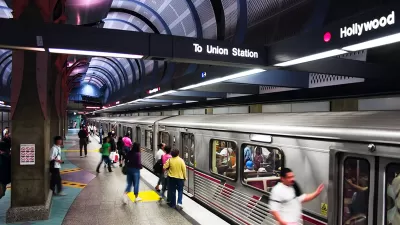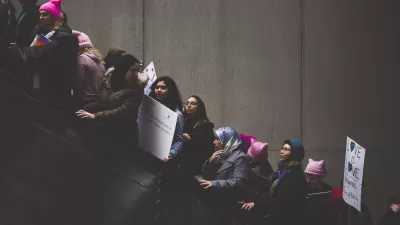In 2008 Los Angeles voters passed a half-cent sales tax to finance construction of a new transit system. In November, Angelenos will decide whether to extend this tax to 2069, allowing Metro to borrow more in the short term and expedite construction.
In October the Westside Urban Forum hosted a panel, "R U Ready 4 Measure J," examining arguments for and against extending the 2008 Measure R sales tax an additional 30 years to 2069. Moderated by David Abel, editor-in-chief of The Planning Report, the panelists-Dan Rosenfeld, Senior Deputy to LA County Supervisor Mark Ridley-Thomas, Denny Zane, Executive Director, Move LA, and California Assemblymember Mike Feuer-make clear cases around Measure J, placing debates around the ballot into a regional and historical political context.
Measure R is responsible for the recent transit boom in Los Angeles County and has been hailed as a political and economic triumph, with more than two thirds of voters supporting a tax at the height of the recession. In extending the sales tax by another thirty years, Measure J will allow the Los Angeles Metro to borrow off of an extended future revenue stream, thus making it possible to expedite project timelines and create much needed jobs. Mayor Antonio Villaraigosa's proposed 30/10 Initiative is where the effort began, "to use the long-term revenue from the Measure R sales tax as collateral for long-term bonds and a federal loan which will allow Metro to build 12 key mass transit projects in 10 years, rather than 30. Accelerating construction of these 12 key Metro projects will result in substantial cost savings."
Assemblymember Mike Feuer championed the initiative in Sacramento, and it was OK'ed by a reluctant LA County Board of Supervisors. Leading the opposition is the Bus Riders Union and coalitions from the City of Beverly Hills.
Thanks to Kevin Madden

Maui's Vacation Rental Debate Turns Ugly
Verbal attacks, misinformation campaigns and fistfights plague a high-stakes debate to convert thousands of vacation rentals into long-term housing.

Planetizen Federal Action Tracker
A weekly monitor of how Trump’s orders and actions are impacting planners and planning in America.

In Urban Planning, AI Prompting Could be the New Design Thinking
Creativity has long been key to great urban design. What if we see AI as our new creative partner?

King County Supportive Housing Program Offers Hope for Unhoused Residents
The county is taking a ‘Housing First’ approach that prioritizes getting people into housing, then offering wraparound supportive services.

Researchers Use AI to Get Clearer Picture of US Housing
Analysts are using artificial intelligence to supercharge their research by allowing them to comb through data faster. Though these AI tools can be error prone, they save time and housing researchers are optimistic about the future.

Making Shared Micromobility More Inclusive
Cities and shared mobility system operators can do more to include people with disabilities in planning and operations, per a new report.
Urban Design for Planners 1: Software Tools
This six-course series explores essential urban design concepts using open source software and equips planners with the tools they need to participate fully in the urban design process.
Planning for Universal Design
Learn the tools for implementing Universal Design in planning regulations.
planning NEXT
Appalachian Highlands Housing Partners
Mpact (founded as Rail~Volution)
City of Camden Redevelopment Agency
City of Astoria
City of Portland
City of Laramie




























